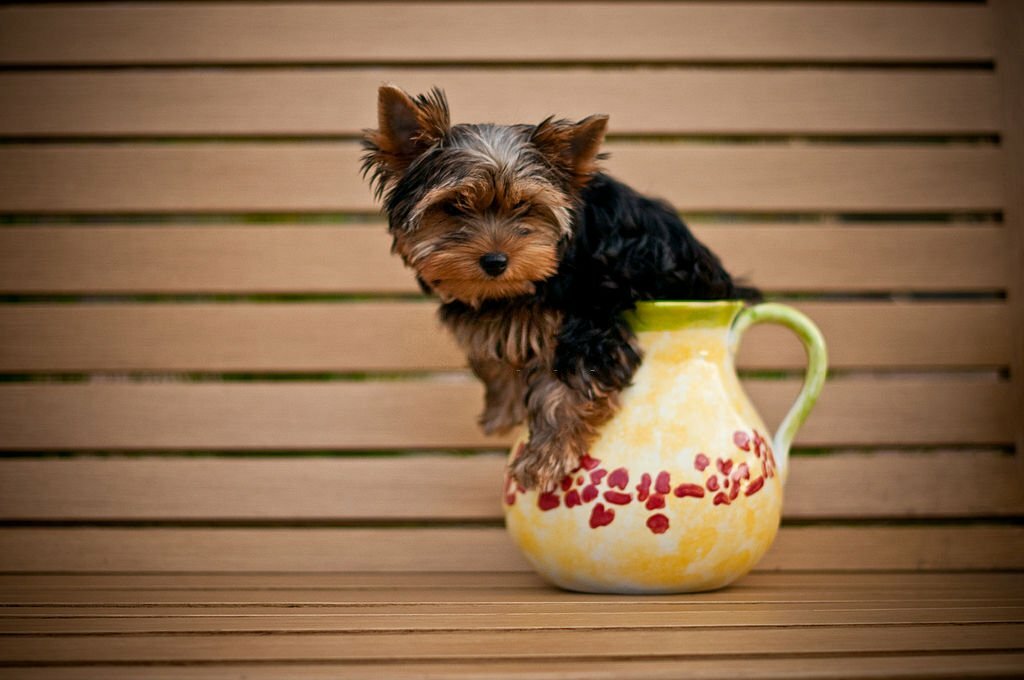Happytail Puppies: Teacup Morkie Puppy Breed
The Teacup Morkie, a designer breed and charming mix of the Maltese and Yorkshire Terrier, has been explicitly bred to be tiny. Morkie puppies for sale are often sought after for their small size. This purebred Teacup Morkie boasts a silky coat and a personality full of confidence — perfect for people seeking morkie puppies for sale with limited space.
They typically weigh between 2 and 5 pounds, making them incredibly easy to carry around and snuggle. Despite their small size, these designer-breed dogs have big hearts full of love and loyalty to their owners.
If you’re considering bringing a Teacup Morkie into your home, it’s wise to learn about their health care, diet, and social needs to keep your new pet thriving.
Key Takeaways
• Teacup Morkies are Maltese and Yorkshire Terrier blends.
• They’re hypoallergenic, lightweight, easy to carry, and affectionate.
• Understanding their health and social needs is key.
The Teacup Morkie is a compact, affectionate dog for small living spaces. These tiny dogs are light to carry and love to cuddle. Proper care ensures your Teacup Morkie stays healthy and happy.
Quick Facts
The Teacup Morkie is a charming mix of its Maltese and Yorkshire Terrier parents, standing a petite 6 to 8 inches tall and tipping the scales at a lightweight 4 to 8 pounds. With a balanced body and a coat that blends the silkiness of a Maltese with the straightness of a Yorkie mix, this breed requires regular grooming to keep looking sharp.
As a member of the American Kennel Club toy dog category, Teacup Morkies may be prone to health issues like hypoglycemia, so owners should be attentive to their needs. Early and ongoing social interaction ensures these tiny companions get along well with people and other pets.
Teacup Morkie Pictures






Overview
Teacup Morkies are a charming mix of Maltese and Yorkshire Terrier traits packed into a tiny, loving companion. These little dogs usually tip the scales at 2 to 5 pounds and stand just 6 to 8 inches tall, making their small stature a distinctive feature.
They boast a soft, silky coat in various colors and a square build that makes them instantly recognizable. While these crossbreeds are praised for their intelligence and ability to learn, they can sometimes be headstrong, which means owners should train them with a gentle hand and plenty of persistence.
Key Features
The Teacup Morkie is known for its distinctive look, which includes a square and compact body. Many have their tails docked, adding to their unique appearance, but this might need extra care as they heal from the procedure.
Their luxurious black, white, silver and fawn coats are available. Regular grooming is crucial to avoid tangles in their long, silky fur.
| Feature | Description | Relevance to Care |
|---|---|---|
| Body Shape | Square, compact | Indicates the breed’s standard appearance |
| Tail | Often docked | Might need extra care after the docking procedure |
| Coat Texture | Long, straight, and silky | Requires consistent grooming to prevent knots |
| Coat Colors | Mainly black, white, silver, and fawn | Coat color does not impact health or grooming requirements |
Owning a Teacup Morkie means being ready to invest time in daily brushing to keep their coat smooth. The variation in color among individual dogs doesn’t affect their health or how you care for their skin.
Breed Origins

The Teacup Morkie is a charming mix of the Maltese and Yorkshire Terrier breeds, emerging as a sought-after pet for those who prefer smaller dogs. The 1990s marked the era when these tiny companions began to gain widespread popularity, appealing to people living in cities due to their manageable size.
- Ancestral Breed Influences
The Teacup Morkie owes its elegant appearance to the Maltese, hailing from Malta with its striking, pure white coat. The Yorkshire Terrier, a dog initially nurtured in England during the 19th century for the practical purpose of catching rats and mice, contributes to this breed’s lineage.
- Rise in Popularity
During the 1990s, people started favoring designer dogs, and the Teacup Morkie, with its convenient size, became a perfect fit for apartment dwellers or those with limited space.
- Understanding Genetic Heritage
The Teacup Morkie is a carefully bred mix, combining the smallest Maltese with Yorkshire Terriers to produce a pint-sized pet. Investigating the traits of the Teacup Morkie reveals insights into their personality and health, tracing back to the qualities of both parent breeds.
Ancestral Breed Development
When tracing the roots of the Teacup Morkie, we find that the Maltese originated from Malta, cherished for their ability to comfort the sick. With their long, silky coats, these dogs were valued throughout history, especially in ancient civilizations, for their gentle nature and soothing effect on their owners.
On the other hand, the Yorkshire Terrier comes from England, where its small size and sharp instincts made it perfect for hunting rodents, playing a vital part in maintaining hygiene in the burgeoning industrial era.
Historical Popularity Surge
Teacup Morkies, a charming mix of Maltese and Yorkshire Terrier, became quite popular in the 1990s. This trend was driven by people moving into smaller homes and looking for dogs that fit well into their family dynamics.
The Teacup Morkie, known for its small size, was the perfect solution for dog lovers with limited space. Breeders focused on mating the smallest Maltese and Yorkshire Terriers to meet the growing demand for these miniature companions.
The popularity of Teacup Morkies reflects the breed’s suitability for the busy, urban lifestyles many people lead today.
Genetic Lineage Exploration
Teacup Morkies are a charming hybrid, blending the Maltese’s historical role as a comforting companion from Malta with the Yorkshire Terrier’s role as a diligent vermin hunter from England. These tiny dogs, developed in the 19th century, inherit a mixture of intelligence and loyalty and a predisposition to some hereditary health issues, showcasing their rich genetic heritage.
Physical Dimensions
Understanding the size of Teacup Morkies is vital for potential owners. These small dogs generally reach an adult height of 6 to 8 inches and a weight of 4 to 8 pounds. Their growth tends to be swift in the initial months, with most hitting their total weight by the time they’re 9 to 12 months old.
Teacup Morkies are tinier than their standard counterparts and are similar in size to other teacup breeds. Their physical characteristics, like a compact, square body and a silky, straight coat, are significant for their looks and understanding of their health needs.
Average Adult Size
Adult Teacup Morkies are pretty small, standing about 6 to 8 inches in height and weighing between 4 and 8 pounds. These tiny dogs have become beloved for their ability to fit comfortably into smaller homes or apartments, making them an excellent choice for people with limited space.
Intentional breeding has resulted in their small size, requiring owners to be attentive to their care. Despite their size, they have a significant presence and can fill a home with love, though owners should be mindful of their health needs due to their diminutive stature and shorter lifespans.
Weight Range
Teacup Morkies are a small-sized breed, typically weighing between 4 and 8 pounds when fully grown. While some may think these dogs should weigh between 2 and 5 pounds, they can develop a bit heavier.
Understanding their weight is vital for anyone considering adding one of these tiny dogs to their home. It tells you about their physical needs and hints at the level of attention they’ll require. These dogs may be small, but they come with a big responsibility.
Owners must be mindful of their fragility and watch out for any health issues with their small size.
Growth Chart
A detailed growth chart is a valuable tool for new Teacup Morkie owners. It shows their size increase from just a few ounces at birth to their mature weight of 2 to 5 pounds and height of about 6 to 8 inches.
This chart is vital for maintaining the health and well-being of these small dogs. It guides owners in providing the right amount of nutrition without the risk of overfeeding, which is particularly important for avoiding weight issues in such tiny breeds.
Additionally, this chart helps track key growth stages and ensure puppies receive the best care during their critical early development.
Breed Size Comparison
The Teacup Morkie is a tiny dog breed perfect for people with smaller homes or apartments. These little dogs stand only 6 to 8 inches tall and tip the scales at a light 4 to 8 pounds, making them much smaller than many other breeds.
They have a beautiful coat that’s straight and silky, showing off shades like black, white, silver, and fawn. Because of their delicate structure, Teacup Morkies must be handled carefully and require regular grooming. These small dogs have a lot of energy and are well-suited to living in apartments.
Their size and ability to adapt make them ideal for families or individuals looking for a lively and affectionate dog that doesn’t need a lot of room.
Physical Build Features
Teacup Morkies are charming, tiny dogs with square-shaped bodies, standing about 6 to 8 inches tall and weighing between 4 and 8 pounds. These dimensions firmly place them in the toy breed category.
Their coat is typically long, straight, and silky, and while their color variations are few, they usually sport shades of black, white, silver, or fawn. Their small stature and appealing looks make them a favorite among dog lovers.
Yet, when considering a Teacup Morkie for a family pet, it’s worth noting that their delicate constitution may not mix well with the rough play of young children. Owners should practice careful supervision to prevent any accidental injuries to these tiny pups.
Temperament Traits

Teacup Morkies are known for their loving nature and intense desire for human interaction. They often express their happiness through playful activities but can be stubborn regarding training.
This breed thrives in various settings, but early socialization is critical to help them get along well with people and other pets. When training a Teacup Morkie, patience and consistency are your best tools due to their occasional stubborn streak.
It’s also vital to introduce them to new people, pets and experiences early on to prevent shyness and the development of Small Dog Syndrome, which can lead to behavioral issues.
Playful and Affectionate Nature
Teacup Morkies are known for their energetic and loving nature. They love to play and show affection to their owners. These small dogs have a lot of energy and enjoy involving their families in fun activities.
Good training is vital to help them use their power in positive ways. Introducing them to new people early on helps them become more comfortable in different social situations.
To prevent the development of Small Dog Syndrome, where a dog becomes domineering and spoiled, it’s good to keep their minds active with various games and challenges. Teacup Morkies should exercise 30 to 45 minutes daily for their health. This keeps them happy and fit and maintains their playful spirit.
Alertness and Vocalization
Despite their small size, Teacup Morkies are attentive and habitually express themselves vocally, making them effective little guardians for their homes. To make the most of their alert nature, owners can train them in a way that sharpens their ability to notice and react to different situations.
However, these dogs can sometimes bark more than necessary, possibly because they seek attention or feel anxious when left alone. Training that targets the reasons behind their anxiety can help them feel more secure, even when their owner isn’t around.
Teacup Morkies can learn to balance their lively spirit with well-behaved conduct with regular practice and positive reinforcement.
Socialization Importance
Teacup Morkies are known for their lively and attentive nature but can develop less-than-desirable behaviors without proper socialization. Teaching them how to interact with people and other animals is crucial in raising a friendly and confident pet.
This training should begin when they’re young to help overcome their natural wariness of new faces and their tendency to be headstrong. Introducing your Teacup Morkie to various environments, humans, and animals in a gradual, controlled manner is the best way to socialize them.
To encourage good behavior, use positive reinforcement consistently during training sessions. This systematic introduction to the world ensures that these tiny dogs grow up to be outgoing and pleasant friends, capable of efficiently handling different social situations.
Stubbornness in Training
Teacup Morkies, despite their smarts, can be pretty headstrong when it comes to training. This calls for a patient and steady hand during their education.
When training these little dogs, using straightforward commands and positive rewards to promote good behavior and reduce stubborn actions is effective. Grasping the unique personality of a Teacup Morkie and applying specialized training methods is critical to overcoming their obstinate traits.
For those teaching Teacup Morkies, patience and a consistent approach are critical. Trainers must be leaders and keep sessions stimulating to attract the dog’s attention.
Establishing a regular schedule and setting clear expectations from the start is vital in shaping the behavior of these clever yet sometimes headstrong dogs.
Adaptability to Environments
Teacup Morkies are known for quickly adjusting to various living conditions thriving in apartments and houses as long as they are given enough love and attention. These small dogs make great indoor pets and form strong bonds with their owners.
They can handle different weather conditions; however, owners should remember that Teacup Morkies are sensitive to extreme cold and heat. During winter, they might need cozy sweaters or a warm spot indoors, and in summer, it’s vital to provide them with plenty of water and cool shade to prevent overheating.
These little dogs’ well-being must be correctly accustomed to their environment.
Common Health Concerns

Teacup Morkies are adored for their tiny stature but are prone to specific health issues because of their genetics. Their well-being needs consistent veterinary check-ups to help prevent these issues and support a long, healthy life.
Genetic Health Risks:
Teacup Morkies can suffer from orthopedic problems like luxating patella and Legg-Calvé-Perthes disease, as well as heart conditions such as degenerative mitral valve disease. These issues can significantly affect their quality of life.
Preventive Vet Care:
Routine health screenings can catch congenital diseases early, while ongoing dental care can prevent further complications. These proactive steps are crucial to managing their health.
Life Expectancy:
Their genetic makeup can influence a Teacup Morkie’s lifespan, but regular preventive care plays a significant role in helping them live longer happier lives. Consistent upkeep and early detection of problems are essential.
Genetic Disease Risks
Teacup Morkies, a small dog breed, often face health challenges related to their genes. They may be more prone to issues with their bones and nervous system.
Genetic testing is valuable for breeders to understand these risks and make choices that could result in healthier dogs in the long run. For Teacup Morkie owners, knowing these genetic risks is vital for avoiding potential problems and finding the right treatments.
Keeping an eye out for symptoms of joint conditions like a dislocated kneecap or brain conditions such as fluid buildup is essential for these dogs’ care. Acting early on these health concerns can significantly improve the quality of life for Teacup Morkies, who may otherwise be at risk for certain inherited diseases.
Preventative Veterinary Care
Caring for Teacup Morkies means staying ahead of their health issues with preventative veterinary care. Early detection and management are crucial to keeping these small dogs healthy.
Vaccinations are a must to protect them from diseases, and regular vet visits help keep an eye on bone conditions like luxating patella and Legg-Calvé-Perthes disease, which their tiny frames make them prone to. It’s also wise to monitor for heart issues such as degenerative mitral valve disease and breathing problems like collapsing trachea.
Dental check-ups play a significant role in preventing tooth and gum problems. Additionally, liver function tests are essential to spot liver shunts early on.
All these steps are part of a comprehensive plan to ensure the long-term health of Teacup Morkies.
Lifespan Expectations
Teacup Morkies, tiny in stature, typically live between 6 to 9 years. They are more prone to health issues such as knee joint problems, heart disease, and brain conditions due to their size and inherited traits. Compared to their larger Morkie counterparts, these pint-sized pups often have shorter lifespans.
Responsible breeding practices play a vital role in reducing these health issues. Breeders should focus on health testing and ethical breeding to improve the health and longevity of Teacup Morkies.
Owners must be proactive with veterinary care to keep their small companions healthy.
Maintenance Essentials

Caring for a Teacup Morkie means paying attention to their unique needs, both physically and in their environment. To keep these small dogs healthy and happy, it’s essential to focus on regular grooming, consistent exercise, accurate feeding, ongoing health checkups, and providing a living space that’s safe and comfortable for them.
Grooming and Physical Care
For a Teacup Morkie, grooming is vital. They need regular brushing to keep their coats free from tangles and baths to stay clean and healthy.
Taking them for regular vet visits is crucial to catch any health issues early and keep them in good shape.
Environmental and Lifestyle Management
Exercise is more than just physical activity; it’s about keeping your Teacup Morkie mentally sharp. Daily walks and games that challenge their mind are essential. Also, make sure they have a cozy spot to call their own, one that suits their small size and keeps them safe.
Grooming Requirements
To keep a Teacup Morkie’s coat shiny and free from knots, brush it daily and get regular haircuts. Small dogs like this need special grooming tools, so use a gentle brush or a fine-toothed comb to keep their fur smooth and pain-free.
Since they are tiny, small breed-specific tools make grooming more manageable and precise. It’s also vital to brush their teeth regularly with dog-friendly toothbrushes and toothpaste to prevent dental problems.
Starting grooming early and keeping it consistent helps the Teacup Morkie get used to the routine, making it less stressful and more cooperative during care sessions. Creating a way that includes both coat and dental care will contribute to their health and happiness.
Exercise Regimen
To keep Teacup Morkies healthy, a consistent exercise routine is crucial, including daily strolls and fun activities. These small dogs do best with a moderate level of activity.
Aim for 30 to 45 minutes of exercise daily to keep them fit, including walks totaling 5 to 6 miles over a week. It’s also vital to keep their minds active to prevent bad habits.
Mental stimulation through puzzle games and teaching them new tricks can significantly benefit their mental health. Starting socialization early is critical for Teacup Morkies to get along well with kids and other pets.
A well-rounded routine like this supports not just their physical condition but their social and emotional well-being, too.
Feeding Schedules
Creating a regular feeding plan is vital for the well-being and development of Teacup Morkies due to their specific nutritional requirements. These small dogs should eat several light meals throughout the day to maintain energy and prevent overloading their digestive system.
Monitoring for hypoglycemia is necessary because it’s a frequent issue in small breeds like the Teacup Morkie. It’s also essential to control meal sizes to avoid weight gain, taking into account each dog’s exercise regimen and calorie intake.
Caring for their teeth is as important as their diet because Teacup Morkies often have dental problems. Regular teeth cleanings and suitable chew toys are part of keeping their teeth healthy.
This ensures that their overall care is comprehensive, addressing dietary and dental needs for a happy, healthy pet.
Health Check-ups
Taking your Teacup Morkie for regular health check-ups is crucial due to their susceptibility to certain hereditary and size-related conditions. These tiny dogs need a well-planned healthcare strategy that includes frequent vet visits for early detection of issues such as low blood sugar, dental problems, and bone disorders.
Vets can monitor their growth, check their teeth, and examine their heart and lungs during these appointments. Catching health problems early can lead to better management and a happier life for these petite companions.
Teacup Morkie owners must keep up with these regular vet exams to maintain their pet’s health.
Comfortable Living Spaces
Teacup Morkies, with their small stature, need living spaces designed to keep them safe and comfortable. These tiny dogs do best to live inside, where they’re protected from harsh weather and potential threats.
Crate training offers them a secure spot to unwind and sleep, which is also helpful for setting a consistent bathroom routine. Positive training encourages them to use a specific site for relief, and sometimes indoor potty solutions are necessary, especially with their small size.
Keeping their living areas clean and easily accessible is vital for the health and happiness of a Teacup Morkie.
Nutritional Requirements
Teacup Morkies need a well-rounded diet to stay healthy and avoid specific health problems. Their small size means their diet must be carefully planned to give them enough energy without causing weight gain.
Balanced Diet Significance
A proper diet ensures Teacup Morkies get all the vital nutrients they need and helps prevent issues common to their breed.
Caloric Consumption Management
Their food intake should suit their petite build and lively spirit, avoiding the risks of underfeeding or overfeeding.
Targeted Dietary Additions
Special supplements might be helpful for their joints, teeth, and fur. Always use these products under a vet’s advice for the best results.
Balanced Diet Importance
Teacup Morkies, due to their small size, have unique dietary needs to stay healthy. A well-balanced diet is vital to prevent common health issues and to manage their susceptibility to conditions passed down from their Yorkshire Terrier and Maltese ancestors.
They require meals carefully tailored to their nutritional requirements, and any deviation from this can lead to health problems such as hypoglycemia. Matching their food intake with age, size, and energy levels helps them grow stronger and interact better with people and other pets.
Caloric Intake Considerations
Managing the caloric intake of Teacup Morkies is critical to preventing health issues like malnutrition and obesity. These small dogs need enough food to meet their energetic needs, but not so much that they exceed their dietary limits.
Monitoring their calorie consumption closely helps them stay at a healthy weight and supports their bodily functions. Due to their small size, Teacup Morkies are prone to low blood sugar.
Offering them frequent, modest meals can keep their blood sugar levels steady. Owners should personalize their Teacup Morkie’s diet based on their activity level, age, and health.
For the best advice on the proper calorie count, please consult a veterinarian to ensure these little dogs get the proper nutrients for their health and happiness.
Special Dietary Supplements
Teacup Morkie owners should consider adding dietary supplements to their dog’s routine to meet the breed’s specific health needs. These supplements can aid in better nutrient absorption, lead to a healthier coat, and strengthen the dog’s immune system.
However, picking the right accessories is vital, as many products are on the market. Each option should be checked for how well it works with a Teacup Morkie’s diet. It’s also vital to recognize the risks of supplements, such as the chance of giving too much or adverse reactions to the dog’s usual food.
Dog owners are advised to get professional advice from a veterinarian to create a supplement plan that’s both safe and effective for their pets.

